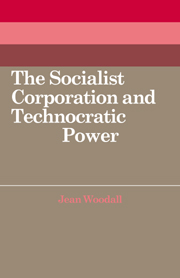 The Socialist Corporation and Technocratic Power
The Socialist Corporation and Technocratic Power Published online by Cambridge University Press: 07 October 2011
It is conventional for Western economists to evaluate the success and worth of economic reform in terms of the amount of independence accorded to the industrial enterprise, and to assume a dichotomy of interest between central planners and the enterprise. However, in a complex economy, the interaction of different levels in the planning and management apparatus is considerably more complex. That intermediate levels in the planning and management hierarchy could act to ‘enrich’ and ‘impoverish’ the communication between central planning authorities and industrial enterprises had been remarked upon by Oskar Lange, and had also been the consideration of the Economic Council when it recommended the abolition of the central boards and their replacement by industrial associations that would be more sensitive to the needs of the economy. Whereas studies of the operation of bureaucracy in both the public and the private sector in the West have revealed that it is facile to describe it as an impartial executive mechanism implementing policy made at the top of an organisation or by outside policy-makers, Polish sociologists have also acknowledged that intra-organisational conflicts and the socio-cultural and political environment play an important role in defining the cohesion of and goals pursued by an organisation. The pursuit of greater specialisation in the division of labour and a speedier rate of technological innovation has expressed itself in a number of reforms carried out at ‘intermediate’ levels in the planning and management apparatus which were expressed in the form of various types of merger and concentration of industrial enterprises.
To save this book to your Kindle, first ensure [email protected] is added to your Approved Personal Document E-mail List under your Personal Document Settings on the Manage Your Content and Devices page of your Amazon account. Then enter the ‘name’ part of your Kindle email address below. Find out more about saving to your Kindle.
Note you can select to save to either the @free.kindle.com or @kindle.com variations. ‘@free.kindle.com’ emails are free but can only be saved to your device when it is connected to wi-fi. ‘@kindle.com’ emails can be delivered even when you are not connected to wi-fi, but note that service fees apply.
Find out more about the Kindle Personal Document Service.
To save content items to your account, please confirm that you agree to abide by our usage policies. If this is the first time you use this feature, you will be asked to authorise Cambridge Core to connect with your account. Find out more about saving content to Dropbox.
To save content items to your account, please confirm that you agree to abide by our usage policies. If this is the first time you use this feature, you will be asked to authorise Cambridge Core to connect with your account. Find out more about saving content to Google Drive.